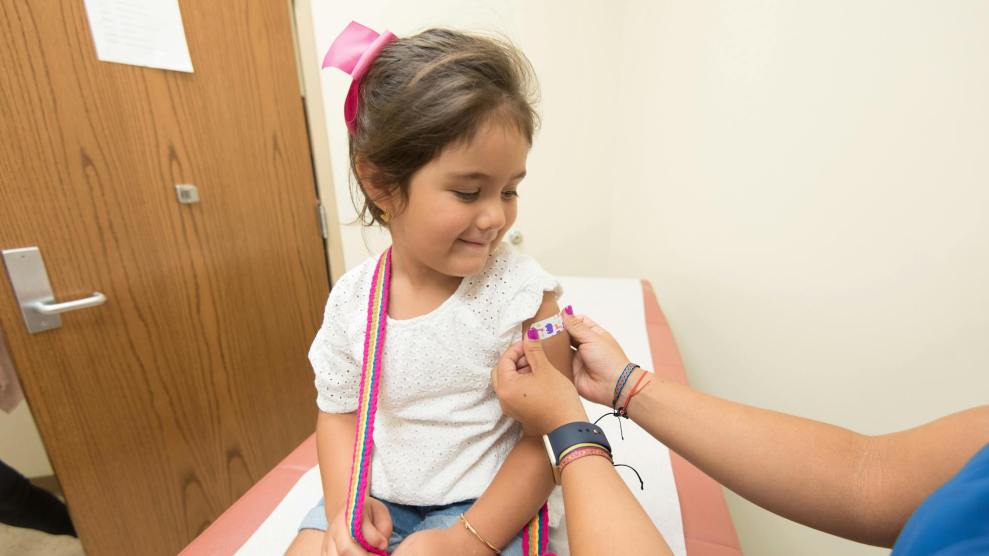The federal government is still failing to control U.S. exports of banned pesticides, ultimately harming millions of foreign farmworkers, according to a recent study. That study, coincidentally, was released within days of a government report that exposes the inability of the Food and Drug Administration to detect pesticide-tainted foods coming back into the U.S.; the latter report is prompting Sen. Patrick Leahy (D-Vt.) to reintroduce his nine-year-old “Circle of Poison” legislation.
 Mother Jones first exposed U.S. companies’ practice of “dumping” banned pesticides overseas in 1979. Reform efforts failed during the Reagan and Bush years; the new export study indicates that the practice thrives under the Clinton administration.
Mother Jones first exposed U.S. companies’ practice of “dumping” banned pesticides overseas in 1979. Reform efforts failed during the Reagan and Bush years; the new export study indicates that the practice thrives under the Clinton administration.
In its spring 1998 report, the Foundation for Advancements in Science and Education analyzed U.S. Customs shipping records and found that reported U.S. exports of restricted and severely restricted pesticides rose 33 percent from 1992 to 1996; of those, six pesticides considered “extremely hazardous” by the World Health Organization skyrocketed more than 800 percent. Reported exports of pesticides banned in the U.S. remained steady, averaging around 6 million pounds a year.
Carl Smith, director of FASE’s pesticide project and author of the report, points out that that’s a very low estimate, because most shipments are not properly documented. And banned and restricted pesticides are not the only culprits; under the Clinton administration, chemical companies have also exported more “never-registered” pesticides. “EPA allows U.S. companies to manufacture and export pesticides that EPA has never evaluated for health or environmental safety,” Smith explains.
Released in March, the FASE study was followed in April by a U.S. General Accounting Office (GAO) report on federal efforts to ensure the safety of imported food. That report detailed the failure of the Food and Drug Administration (FDA) to detect pesticide-tainted foods amid the flood of imports.
“The FDA has the responsibility for ensuring that imported foods are safe,” said Sen. Leahy after reading the GAO report. “Yet the FDA only relies on port-of-entry inspections to check food. This is ineffective because less than 2 percent of all foreign shipments are currently inspected.” By contrast, in 1992 the FDA inspected about 8 percent of imports.
The inspection rate has dropped due in part to the “inability [of the FDA] to keep pace with a rising level of imports,” the GAO found. Food imports have doubled in the last five years and look like they will continue to grow quickly, says Bob Lake, director of policy at the FDA’s Center for Food Safety and Applied Nutrition. “There are two and a half million shipments of food per year coming into the U.S., most of which is fruit and vegetables,” says Lake. But he defends the FDA, saying that an overwhelming majority of domestic and imported produce is found to be in compliance with EPA pesticide tolerances.
The GAO report has prompted Sen. Leahy to begin redrafting his twice-defeated “Circle of Poison” bill, which would stop U.S. companies from exporting banned and unregistered pesticides, and introduce tougher inspections to keep dangerous pesticides from returning to American supermarket shelves.
“That bill was designed to plug a huge loophole in current law that allows U.S. chemical companies to manufacture and sell overseas pesticides which are banned in the United States,” said Leahy in May, announcing his third attempt. “Unfortunately, the chemical manufacturers blocked passage of that bill.”
Leahy first tackled the issue in 1989 with then-Sen. Al Gore, then-Rep. Leon Panetta (later Clinton’s White House chief of staff), and then-Rep. Dan Glickman, now Secretary of Agriculture. The bill failed in 1990 and 1991; similar legislation introduced by the Clinton administration in 1994 met the same fate. Leahy says he’ll reintroduce his bill in this session of Congress or the next.
FDA takes issue with the senator’s critique. Lake says that FDA does find illegal amounts of pesticide residues in 1-2 percent of domestic produce, and up to 5 percent of imported produce, but says that “We have not found evidence that the ‘circle of poison’ is a reality.”
The American Crop Protection Association, a pesticide industry group, says the legislation is unnecessary because banned pesticides have not appeared in imported food. But a search of FDA inspection data by the MoJo Wire shows that’s not quite the case: Chlordane, for example, an extremely hazardous pesticide banned from any food use in the U.S., has reappeared on imported Mexican carrots as recently as 1996.
Another issue that Leahy’s bill would address is the misuse abroad of restricted-use pesticides. In some cases the FDA has found imported produce tainted with pesticides not approved for that particular commodity, or not approved for food use at all, as with the chlordane we found.
And U.S. pesticide makers often don’t warn users overseas about the true hazards of working with these chemicals, according to data gathered by the United Nations Food and Agriculture Organization. “There is a real problem in Latin America with restricted-use products,” says Smith. “Nearly two-thirds of these countries reported that the labels on pesticide products do not contain the same recommendations for safe use that would be expected in the U.S.”
“This whole subject hits a nerve because it raises not only trade issues, but also moral issues,” Smith adds. “We’re talking about chemicals that are so dangerous that the U.S. has either banned them outright, or made it illegal to use them without a full-body protective suit and a respirator. How do you justify sending them to places where they’ll end up being sprayed by shirtless farmworkers, often children, who have no idea of their hazards?”
Environmentalists are urging the Clinton adminstration to sign the Prior Informed Consent (PIC) treaty in the Netherlands in September. The international agreement requires that chemicals banned or severely restricted in more than one country and more than one region must be listed; other countries would then have nine months to accept or put conditions on imports of those chemicals. White House officials indicate that Clinton will sign the treaty; it must then be ratified by the Senate before the administration can enforce it.
“The Prior Informed Consent treaty is a good first step but it is not enough,” Leahy told the MoJo Wire. “It would allow foreign governments to permit the shipment of pesticides banned or restricted in this country to their country. Those dangerous pesticides could then be used on foods which are shipped back into the United States and sold in our supermarkets.”
The Circle of Poison bill is about more than U.S. public health, notes Smith. “It is about American people being responsible to other countries. When push comes to shove, we did not have overwhelming public support [for past legislation]. It is a matter of ethics. We can get any vegetable in any season at a low price. Consumption is driving us to drastic measures.”
Leon Panetta, who worked on Circle of Poison eight years ago, sees it as an uphill battle which Leahy will have to keep fighting and bringing to the public’s attention.
“What may have to happen is a crisis of some kind,” says Panetta. “I have always said you get things done in democracy through leadership or crisis, and unfortunately there is not a lot of leadership in Congress right now.”















